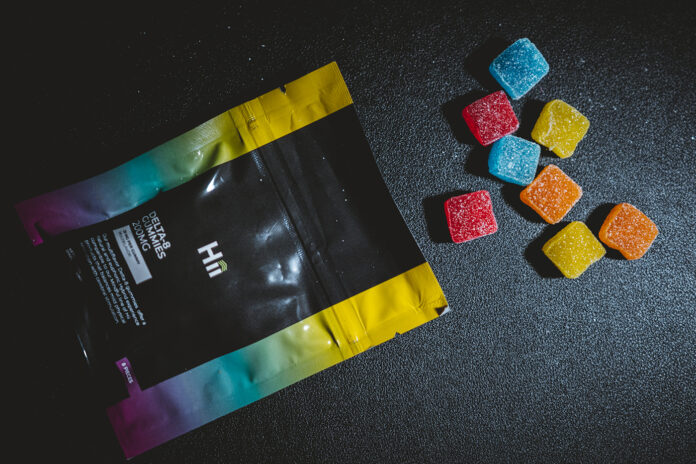Delta-8 THC is a growing source of infighting in the hemp community. The controversial cannabinoid is one of the fastest-growing product categories in the sector, and arguably saved the industry from collapse during the COVID-19 recession. And yet, many hemp industry leaders regard Delta-8 with distaste, if not contempt. In March the U.S. Hemp Authority announced it would “reject certification of Delta-8 THC,” and its president told an industry publication Delta-8 potentially could “bring down the entire hemp industry.” Currently, fifteen states ban Delta-8 sales.
As a veteran of the cannabis and hemp spaces, a producer of Delta-8 (among many other hemp products), and someone who is deeply committed to consumer safety, I’m asking leaders in my industry to reconsider their stance. Delta-8 addresses an important need. Rather than prohibitionist bans (which won’t work and instead will increase consumer hazards), we can better protect consumers and support the hemp industry by promoting sensible regulation.
Acceptance of Delta-8 within the hemp industry would benefit growers, public safety, and American hemp’s economic future.
Delta-8 THC to hemp’s rescue
Although some in the hemp space claim Delta-8 is destroying the industry’s legitimacy, the truth is hemp was in serious trouble in 2020 and Delta-8 helped farmers avert catastrophe. Regulatory inaction by the U.S. Food and Drug Administration (FDA) created huge financial setbacks for growers. After passage of the 2018 farm bill, growers assumed the FDA would establish a framework to regulate CBD products. That framework never materialized. Major consumer-packaged-goods manufacturers and retailers wouldn’t enter the CBD space without FDA guidelines in place. Many optimistic hemp growers produced uncontracted crops, and the surplus of available biomass caused prices to crater. Farmers were left with millions of pounds of unsold hemp.
Delta-8 gave growers and extractors an outlet for the massive oversupply. Indeed, many directly attribute the rise of Delta-8 production to FDA inaction. Vince Sanders, founder and president of CBD American Shaman, believes Delta-8 is just one of the many cannabinoids producers could source from the oversupply. “If we have several different minor cannabinoids that we can pull from and start using more of the biomass that is literally rotting, it would be a wonderful thing for the American farmer,” he said.
Should we really let thousands of American businesses go under just because some insist hemp products cannot be mind-altering? Much of the underlying hostility regarding Delta-8 is due to its potential as an intoxicant. Hemp Industries Association President Rick Trojan believes although people react strongly to the idea of intoxication, “That word isn’t medically or clinically defined, so it shouldn’t be a word that’s legally defined.” Too often, we bow to binary categories when discussing cannabinoids: Because it’s not intoxicating, CBD is considered defensible medicine, but any cannabinoid that creates euphoria is derided as a dirty drug.
Intoxication accusations
The truth is, Delta-8 is similar in molecular structure to Delta-9 THC, the cannabinoid most people mean when they say “THC.” Delta-9’s intoxicating properties are undeniably controversial, but the substance nevertheless offers numerous important medical applications.
While we need more scientific exploration of Delta-8’s benefits, research indicates the substance has properties similar to Delta-9’s. In a 2019 study, University of New Mexico researchers found Delta-9 “showed the strongest correlation with therapeutic relief and far less evidence for the benefits of relying on the more socially acceptable chemical, cannabidiol.” With only eighteen states permitting people access to Delta-9 without a prescription or medical card, is it any wonder people seek out Delta-8 as an alternative?
Of course, some people consume Delta-8 simply to get high—and I have no problem with that. Euphoria is good for people, and I see no value in puritanical gatekeepers deciding which purposes for cannabinoid use are approved.
Delta-8 sometimes unironically is equated with bathtub gin—as if bathtub gin wasn’t a direct result of Prohibition.
Waiting for regulations
No, Delta-8 isn’t regulated. Neither is CBD, but so far no states have tried to ban that cannabinoid. Untested, unregulated CBD products are sold online and at gas stations everywhere. In 2020, nearly half the 150 CBD products the FDA tested for cannabinoid content were inaccurately labeled, and many contained levels of THC beyond the legally defined 0.3 percent. Yet, even former FDA Commissioner Stephen Hahn called the idea of banning CBD “a fool’s game.” Millions of people benefit from CBD use. Manufacturers that sell CBD without testing, not the cannabinoid itself, are the problem. Our response should be to regulate CBD, not take it away from people who want it.
The same goes for Delta-8. State bans will empower illegal markets to meet the demand for Delta-8 with potentially hazardous products. The hemp and cannabis industries should know better than anyone else that prohibition does not work.
Erica Stark, executive director for the National Hemp Association, acknowledged the issues surrounding Delta-8 are complex, but she also advocates a pragmatic approach. “People want [Delta-8] and should have access to it,” she said. “Anything that can help hemp farmers and entrepreneurs be successful is something we support.” This reality-based mindset will benefit farmers, consumer safety, and the industry at large, and I hope it will be adopted by more industry leaders.

Robert Johnson is chief executive officer at Custom Capsule Consultants, a leading California white-label supplement manufacturer and creator of the CBD is Better product line. He has worked as a consultant, product developer, and consumer trend expert in the hemp, cannabis, and supplement spaces since 2008.












